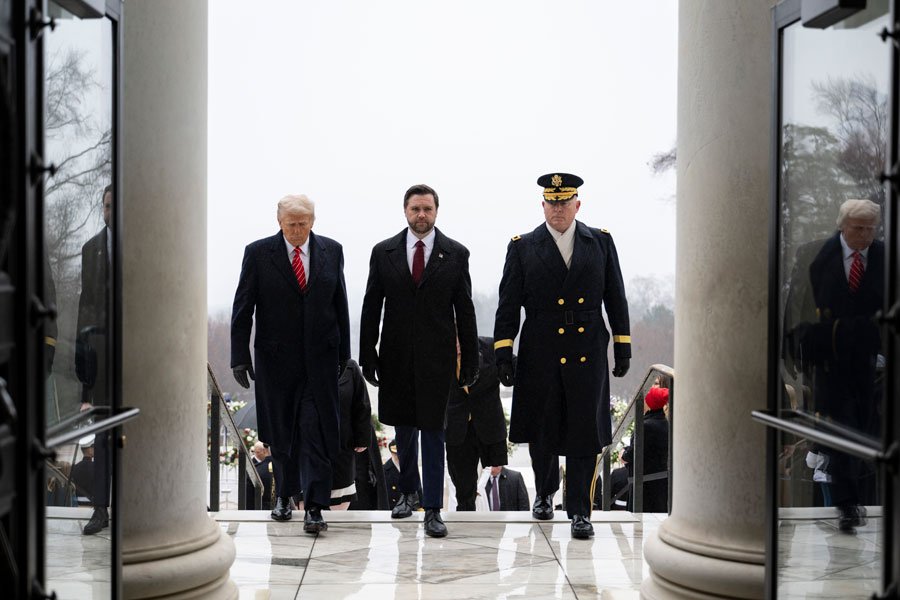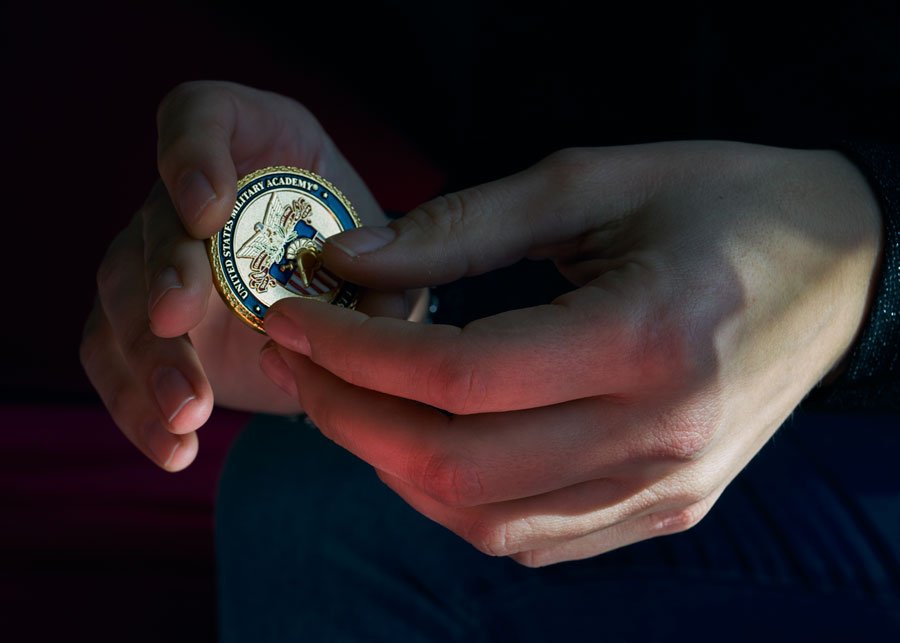‘I’m Just Trying To Be Good At My Job’: Transgender Troops Brace for Decision on Military Ban West Point Graduate Alivia Stehlik Is One of Thousands Whose Military Careers Are in Jeopardy
Twelve years ago, Army 1st Lt. Alivia Stehlik walked the parade route for President Obama’s second inauguration, making sure everything would go smoothly. Stehlik spent weeks planning for the Army’s role in the inaugural parade, training troops, and instructing a group of high-ranking generals and admirals on marching in step.
Six-foot-two, with a West Point pedigree, a Ranger tab, ramrod straight posture, and an infectious smile, Stehlik was an ideal instructor. As a ceremonies officer stationed at the Army’s Old Guard in Washington, D.C.—which guards the Tomb of the Unknown Soldier, conducts military funerals at Arlington, and serves as the president’s ceremonial escort—Stehlik was an expert in marching. The generals and the admirals, on the other hand, needed some refreshers.
Once, Stehlik was training a female admiral who asked why there were no women in the Army’s honor guard. Back then, Stehlik presented as a man. She would transition years later, after the military allowed transgender troops to start serving openly.
Stehlik had wondered about the admiral’s question too—other services’ honor guards were mixed gender. But the Old Guard’s ceremonial company pulled exclusively from Army infantry, and women weren’t allowed in the infantry until 2016.
“Ma’am,” Stehlik told the admiral, “that’s way above my paygrade.”
Today, Stehlik, now a major, is waiting for another decision from far above her paygrade about who has the right to serve.
President Trump made transgender issues a centerpiece of his campaign, promising to “stop the transgender lunacy” and “get transgender out of the military.” During his first term, Trump banned transgender people from serving in the military, though ultimately troops who had already transitioned—like Stehlik—were grandfathered in.
That may not be the case this time.
On Monday, in his inaugural address, Trump proclaimed that the government recognizes “only two genders: male and female.” Later that day, he repealed an executive order by President Biden allowing transgender people to serve. Now, Stehlik and thousands of other troops, stationed from Connecticut to Kentucky to California, are bracing to see if Trump orders a new trans ban.
While the wait—and weight of the decision—may be agonizing, there is little transgender service members can do to make their case. Like any good soldier, Stehlik, now an Army physical therapist, went to work at Fort Campbell in Kentucky on the frigid morning after Trump’s inauguration.
“I actually don’t spend time speculating about it,” she said. “I’m just trying to be good at my job.”
The lessons carried over from the Old Guard, where everything was drilled to perfection: every footstep in lockstep, every uniform exactly tailored. Nothing could be out of place.
“There was no allowance for, ‘We messed up this time.’ There was no lexicon for that in the Old Guard,” Stehlik said. “Being perfect means not standing out.”
‘Chick With a Ranger Tab’
When Stehlik first transitioned in 2017, she worried about standing out.
“I was the only six-foot-two chick with a Ranger tab,” she said.
But these days, there are other female Rangers who wear the revered badge, other transgender soldiers in uniform. She has deployed to Afghanistan and traveled with the Army to Jordan, the UAE, Lebanon. She has treated thousands of soldiers.
Today, she is the director of holistic health and fitness for the 101st Airborne Division at Fort Campbell. She lives about an hour south of base in Nashville with her partner and a wildly affectionate dog named Mozzie. She rides her motorcycle, plays keyboard and piano, guitar and bass, browses bookstores on the weekend. Despite the growing political tension over trans issues, life is normal most of the time. She does not feel much like she stands out anymore; she does not want to talk about standing out.

Stehlik in her home gym in Nashville, Tennessee. (Photo by Stacy Kranitz for The 19th)
Instead, she wants to talk about her job. On Tuesday, the day after the inauguration, there was a quarterly brigade training briefing and a suicide prevention planning meeting. A peer-reviewed paper on optimizing women’s performance in sports demanded attention on her desk at home, where an Army Ranger flag hangs above the squat rack in her garage.
In 2022, an opportunity came up for Stehlik to travel to the Middle East as a physical therapist. As a trans soldier, she needed a medical waiver to go. Nobody in her unit knew the correct protocol for that, so Stehlik cold-emailed the U.S. Central Command surgeon asking for permission.
“She’s top notch,” said Becky Wagner, a former active duty Army physician’s assistant who served with Stehlik during her deployment to Afghanistan. “She’s just a good soldier.”
When you’re a good soldier, Stehlik says, you stay out of politics.
“That’s kind of a fundamental part of being a soldier,” she said.
About 15,000 Impacted
Thousands of transgender service members serve in the military, though the exact number is unclear. Estimates from two research centers, the Williams Institute at UCLA and the now-defunct Palm Center have put the figure around 15,000, but the Pentagon does not publicly track the number.
Data from UCLA also shows that transgender Americans sign up to serve their country at a rate twice that of cisgender people. Most transgender servicemembers have more than 12 years of service, said Rachel Branaman, the executive director of the Modern Military Association of America, which advocates for LGBTQ service members.
Any talk of a ban “harms readiness,” Branaman said.
Removing thousands of long-serving troops, she said, represents “a lot of specialized training that essentially costs billions of dollars and creates an operational gap.”
Transgender soldiers and sailors were first explicitly banned from military service in the 1960s. But things started changing after the repeal of “don’t ask, don’t tell,” the policy that had prohibited gay and lesbian troops from serving openly. In 2013, the Army permitted Cpt. Sage Fox, a transgender woman, to return briefly to active duty, and by 2015, the military branches had made it difficult to dismiss service members for their gender identity. In 2016, the Obama White House officially ended the ban on transgender service members.

Army Maj. Gen. Trevor J. Bredenkamp, President Donald Trump, and Vice President JD Vance prepared to lay a wreath at the Tomb of the Unknown Soldier before Trump’s inauguration. (Photo by Elizabeth Fraser/Arlington National Cemetery)
But in July 2017, amid a growing backlash among conservatives, Trump tweeted that he was reinstating the ban.
“After consultation with my Generals and military experts, please be advised that the United States Government will not accept or allow Transgender individuals to serve in any capacity in the U.S. Military,” he wrote. “Our military must be focused on decisive and overwhelming victory and cannot be burdened with the tremendous medical costs and disruption that transgender in the military would entail. Thank you.”
West Point Roots
Stehlik grew up the eldest child of an Army officer, a West Point graduate, and from her earliest memories, she wanted the same life for herself. She remembered the tanks from her father’s early career—the “real” Army, she says—before he settled into a more sedate second act in operations research at the Pentagon.
She spent much of her childhood and teenage years in northern Virginia, where her mother homeschooled her and her four younger siblings. In what would have been her senior year of high school, she took classes at local community college, and then got an appointment to West Point, arriving in the summer of 2004. It was years before Stehlik realized she was transgender, but she felt at home in the Army.
From the beginning, she knew she had been right: The life of a soldier was the life for her. Even during West Point’s notoriously difficult first year, she loved it—fellow cadets called Stehlik the “happy plebe.”
“I think I felt seen, I felt valued for the things that I could do,” Stehlik said. “I like doing hard things. I just find intrinsic value in soldiering and being around soldiers.”

Stehlik holds a military challenge coin from West Point given to her by cadets in the Academy’s LGBTQ club after they invited her to speak to them last fall. (Photo by Stacy Kranitz for The 19th)
So when Stehlik graduated from West Point, she chose to be a soldier’s soldier, commissioning as an infantry officer. It was 2008, the wars in Iraq and Afghanistan were in full swing, and it would be nearly eight years before women would be permitted to serve in combat roles, like the infantry. But Stehlik had not yet come out as transgender. Like any good soldier, she wanted to be where the action was.
Award-Winning Journalism in Your Inbox
Stehlik graduated from the Army’s grueling Ranger school course, and then was stationed at Camp Casey in South Korea, where she served as an infantry platoon leader. Her plan had been to apply from there to the 75th Ranger Regiment. But she was newly married and worried the intensive training and deployments would take a toll on her relationship.
So instead, she accepted orders to the Army’s storied Old Guard. She still tears up when she thinks about greeting the caskets of fallen troops coming back from Iraq or Afghanistan.
“There’s not a lot that you can compare to having to give a flag to somebody’s surviving family,” she said. “How do you do right by the people that are willing to give their life for this idea of what we’re doing here in America, this idea of our country and of freedom and opportunity?”
Rise in Anti-LGBTQ Bills
Stehlik began her transition at Fort Carson in 2017, not long after she graduated from physical therapy school at the Army’s medical training program at Baylor University.
Even then, antitrans sentiment and legislation was growing across the country. By 2017, legislators in Texas, where Baylor is located, had started introducing bills seeking to regulate which bathrooms trans people could use. Anti-LGBTQ bills under consideration across the country have swelled in recent years, from 81 in 2020 to more than 530 in 2024, according to the ACLU.
In Kentucky, where Stehlik is currently stationed, lawmakers in 2023 overrode a veto to pass a law restricting discussion of gender identity and sexual orientation in schools and requiring most transgender minors to detransition, among other things. That same year, at a conservative conference, the political commentator Michael Knowles called for “transgenderism” to be “eradicated from public life … for the good of society.”
When Trump tweeted that he was going to ban trans soldiers, Stehlik was stationed at Fort Carson, Colorado.
At first, she missed the news. Her first patient of the day came in and told Stehlik with conviction, “I don’t care what anybody says, I want you to be my therapist.”
“I was like, ‘OK … cool. Yep, I’m your therapist,’” Stehlik said.
But then her sister texted, asking if she was all right, and explained what had happened.
Trump’s tweet reportedly took the Pentagon by surprise, and it took two months for Defense officials and the White House to hash out what exactly it meant. Ultimately, military policy prohibited new transgender troops from enlisting and active-duty service members from transitioning, but it did not remove transgender servicemembers from duty, nor did it prohibit them from re-enlisting.
Stehlik said she just kept doing her job. Shortly after taking office in 2021, President Biden signed an executive order rescinding the ban.
‘Unapologetically Who I Am’
Stehlik had moved into physical therapy because she loved helping people stay fit and saw the field as a way to directly help soldiers on the front line, keeping them deployable and supporting the mission.
But she worried how troops would react to being treated by a transgender therapist, especially as she prepared to go to Afghanistan. She was concerned her fellow soldiers might feel uncomfortable, closed off to her, which could make providing care more difficult.
But that wasn’t the case, she said.
“People were way more vulnerable with me than I expected them to be. Even these young hotshot infantry and Special Forces guys that are out there, the last thing I expected was higher levels of vulnerability from them about how they were actually doing. But I got that way more often than I expected.
“And I think it was because I just exist as myself. I’m really unapologetically who I am. And I think that gives other people the freedom to be that too.”

Stehlik at home with her beloved dog, Mozzie. (Photo by Stacy Kranitz for The 19th)
Other soldiers who have served with Stehlik said they saw the same thing.
“I’ve brought in some of the oldest, crustiest Green Berets that I know,” said Lt. Col. Dan Brillhart, an Army physician who has run medical training exercises with Stehlik. Initially, he said, some of them were uncomfortable about working alongside Stehlik.
“They inevitably, universally fall under her spell,” Brillhart said. “They’re like, ‘She’s amazing. … When I come back next year, I want to work with Alivia.’”
He wasn’t the only one who spoke about a sort of magic she brought to her work.
“I used to call her the brigade healer,” said Col. Jon Post, who worked with Stehlik at the security forces assistance command, providing support to partner countries in the Middle East. “She is incredibly emotionally intelligent.”
“Her thing was always: Be a better human,” said Staff Sgt. Logan Haller, who served as her physical therapy tech during her deployment to Afghanistan. “She sat me down and said, ‘OK, Logan, where do you want to go with your life, with your career? … As a soldier, she was awesome.”
Haller remembered one soldier who kept calling Stehlik “sir” instead of “ma’am,” kept saying “he” instead of “she.” Stehlik, he said, corrected him from time to time. But Haller finally pulled the soldier aside.
“I told him, ‘Hey, either get it right or get out. Find somebody else to take care of you,’” he said.
He reminded the soldier of a core Army value: “You treat everyone with dignity and respect.”
“He figured it out after that,” Haller said.
Overrun by ‘Woke’ Policies
A Quinnipiac poll from the time of Trump’s first military trans ban found that nearly 70% of Americans supported transgender troops being permitted to serve openly. A 2020 study found a similar level of support among active-duty service members.
But throughout his second run for the White House, President Trump talked about reinstating the ban. In December, he promised to “sign executive orders to end child sexual mutilation, get transgender out of the military, and out of our elementary schools and middle schools and high schools.”
His nominee to lead the Defense Department, former Fox News host Pete Hegseth, has railed against the military being overrun by “woke” policies that he claims have demoralized service members and weakened our fighting force. Other Republican lawmakers have claimed that caring for trans troops is costing the military too much money.
Between 2016 and 2021, the Pentagon spent about $15 million on healthcare for transgender troops, the vast majority of that on therapy visits, many of which are mandated by military policy on transgender service members and not necessarily requested by troops themselves. By comparison, in 2014, as the military began to consider allowing trans people to serve openly, it spent more than $80 million on erectile dysfunction drugs.
Experts who spoke with The War Horse were hesitant to speculate on what a new ban might look like. But they said it could span a range of possibilities, from merely not allowing new transgender enlistees to discharging thousands of active-duty troops.
“I think everybody is just waiting to see what’s coming,” Branaman said.
She and other experts said that the more extreme possibility—removing active-duty transgender troops—could be logistically very difficult for the military branches.
“There’s going to be administrative chaos,” Branaman said.
Sue Fulton, a senior advisor to SPARTA Pride, an association of active-duty transgender military members, said that “trying to implement some sort of new ban would be a mess and a problem for commanders.”
Typically, service members who are removed from active duty for nonpunitive reasons are discharged either administratively or through a medical route. Both processes can be time-consuming and burdensome, with various policies spelling out procedures for required hearings, boards, and potential appeals. It can be more complicated to separate people in certain critical specialties or service members who are close to retirement.
When the military discharges a service member for medical reasons, it can take anywhere from six months to more than a year. Speeding things up would likely require changes to other military policies.
Luke Schleusener, the head of Out in National Security, a nonpartisan nonprofit for queer national security professionals, said that those sorts of changes would be “kind of capricious.”
“It’s going to say to a population that has been serving pretty much continuously that you are suddenly not eligible, not because you no longer meet requirements, but because we’ve changed requirements to specifically expel you.”
He and other experts also highlighted concerns about recruiting goals, which the military branches have struggled to meet in recent years. A 2024 study from the Public Religion Research Institute found that 30% of Gen Z identifies as LGBTQ.
“Who’s going to join the military from Gen Z or Gen Alpha if you can’t bring your gay friend or your trans friend?” Schleusener said.

Stehlik plays the piano in her home on the afternoon of Trump’s inauguration. (Photo by Stacy Kranitz for The 19th)
A Quiet Inauguration Day
Twelve years ago, after weeks of training and preparation, Stehlik watched the inaugural parade from CNN’s press box, on hand to provide expert commentary on parade protocols. This Inauguration Day, she was at home in Nashville.
It was Martin Luther King Jr. Day, so she had the day off, although her boss had already emailed her with a work question. She kept half an eye on her phone, waiting to see if any more messages from her boss came in, while playing around on a keyboard in an upstairs spare bedroom.
Stehlik has played the piano since she was seven. She says it’s the thing she’s done the longest in her life. The thing she’s done the second longest is serve in the Army.
At West Point, in Eisenhower Hall, a nine-foot Steinway grand piano sits in a ballroom. Stehlik remembers when she first played it, framed by floor-to-ceiling windows overlooking the Hudson River.
Our Journalism Depends on Your Support
“I assumed that it wouldn’t be there when I came back,” she said. It seemed out of place; she thought it must usually be stored somewhere else. But when she next went back to the ballroom, months later, the Steinway was still there.
She got in the habit of playing it, walking down the hill from the barracks to the ballroom whenever she needed a break from the grind of cadet life.
On Inauguration Day in Nashville, Stehlik did not want to talk about politics; the inauguration seemed political. But she talked about West Point, where she began her life in the Army.
“I am as optimistic and idealistic as West Point is,” she said. “Sometimes it feels naive to be idealistic, but I just am. I am a hopeful, optimistic human.”
Whenever Stehlik goes back to West Point, she makes it a point to walk down to Eisenhower Hall to play the piano.
“Sometimes it’s hiding in a back corner behind curtains, and sometimes it’s out in the middle of the ballroom.”
But, she said, “That piano is always there.”
This War Horse story was reported in Nashville by Sonner Kehrt, edited by Mike Frankel, fact-checked by Jess Rohan, and copy-edited by Mitchell Hansen-Dewar. Hrisanthi Pickett wrote the headlines.
Photos for the story were provided through a partnership with The 19th, an independent, nonprofit newsroom reporting at the intersection of gender, politics and policy.





Comments are closed.